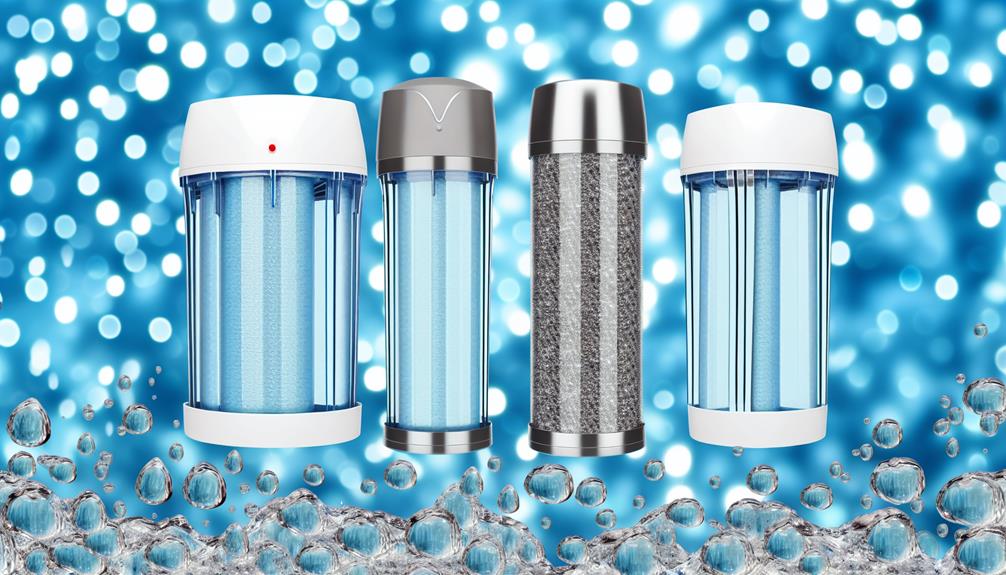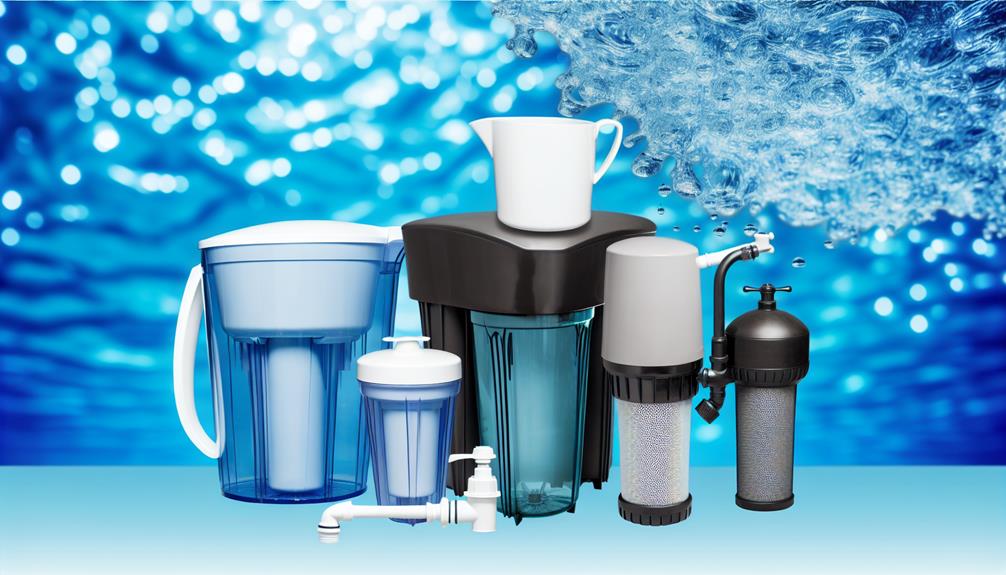Have you ever paused to consider what's really in the water you drink every day? With the growing concerns about chemical contaminants, you're likely searching for the best ways to safeguard your family's health.
Among the myriad of options, some water purifiers stand out for their ability to filter out harmful chemicals, but how do you discern which is right for your home? You'll find that pitchers, under-sink models, and whole-house systems each bring their own strengths to the table.
As you weigh the convenience of a simple pitcher against the thoroughness of a multi-stage system, remember that the ideal solution should not just clear out the bad, but also maintain the beneficial minerals that your body needs.
Stay tuned as we explore the top contenders in home water purification that strike this delicate balance, ensuring your peace of mind with every glass you pour.
Understanding Chemical Contaminants
To safeguard your health, it's crucial to recognize that chemical contaminants like PFAS, VOCs, and heavy metals can lurk in your tap water, posing significant risks that can be mitigated with the right water filtration system. The Environmental Working Group (EWG) maintains the EWG's Tap Water Database, providing a detailed analysis of drinking water quality across the United States, highlighting the presence of such contaminants.
PFAS, dubbed forever chemicals due to their persistence in the environment, are particularly concerning. Linked to cancer, high cholesterol, and pregnancy complications, they necessitate a robust response. Water filters, like those from Clearly Filtered, Zero Water, and Epic Pure, are designed to block PFAS to non-detectable levels. The Carbon in activated carbon filters and reverse osmosis filters are common and effective methods to remove contaminants.
The Water Quality Association underscores the importance of regular filter maintenance to ensure ongoing protection. Though initial costs for systems like the travel Berkey can be a consideration, their longevity—up to eight years—demonstrates long-term cost-effectiveness and reliability.
As the EPA contemplates new regulations to restrict PFAS, water filters remain an essential interim shield against these hazardous invaders in your drinking water.
Pitcher Filter Efficacy
While recognizing the importance of mitigating chemical contaminants, it's equally critical to evaluate the efficacy of pitcher filters, which offer a convenient, household-level solution for improving water quality. Understanding the capabilities of your water pitcher in eliminating harmful substances can be quite reassuring.
Pitcher filters employ a carbon block or granulated activated carbon to effectively remove various impurities. These filters aren't all created equal, so you'll want to look for a filter that can remove a broad spectrum of Common Water Contaminants. Here's what some of the best filter pitchers can do:
- Eliminate Chlorine: Enhance the taste and smell of your drinking water.
- Reduce Heavy Metals: Protect your family from the risks associated with lead and mercury.
- Filter Out Pesticides: Keep harmful agricultural chemicals out of your water.
- Remove Volatile Organic Compounds: Reduce health risks by filtering out VOCs, which are commonly found in household products.
- Minimize Pharmaceuticals: Address the growing concern of medications seeping into water supplies.
Pitcher filters can't handle everything though. For complete chemical safety, you may need to consider additional purification systems. Always check the manufacturer's claims against independent testing to ensure that your water pitcher lives up to its promises.
Reverse Osmosis Systems
Reverse osmosis systems stand as a powerful tool in your arsenal for purifying drinking water. They employ a semipermeable membrane that adeptly filters out a vast array of contaminants, including persistent chemicals like PFAS. These systems are lauded for their efficiency in eliminating toxins that other filters may miss, providing you with water that not only tastes better but also aligns with health benefits by reducing your exposure to harmful substances.
You should check your local drinking water quality report to understand the specific contaminants in your water supply. This report can guide you in selecting a reverse osmosis water filtration system that targets those pollutants. Most reverse osmosis systems can remove up to 99% of contaminants, including heavy metals and chemicals, ensuring that the water you drink is of the highest purity.
It's essential to be mindful of maintenance when investing in a water treatment system. The filter lasts but requires regular replacement to ensure that the system's performance remains optimal. While considering the cost of replacement filters, remember that the investment contributes to long-term chemical safety in your home. Regular upkeep of your reverse osmosis system is crucial to maintain its efficacy in providing clean and safe drinking water.
Activated Carbon Solutions
Building on the effectiveness of reverse osmosis systems, activated carbon solutions offer an alternative or complementary method to further purify your water by reducing contaminants such as PFAS. As you delve into the world of home water filters, it's crucial to understand how these solutions work to provide safe drinking water for you and your family.
Activated carbon filters are a cornerstone of water purification for several reasons:
- Affordable Protection: They're cost-effective, ensuring you don't break the bank for quality drinking water.
- Versatile Use: These filters can be integrated into under-counter water filters, faucet-mounted models, or even portable pitchers.
- Eradicating Contaminants: The best water filters equipped with activated carbon are adept at making your water safer by adsorbing a variety of organic compounds and pollutants.
- Ease of Maintenance: Replacing activated carbon is straightforward, maintaining the filter's efficiency without hassle.
- Taste and Odor Improvement: Beyond safety, these filters remove unpleasant tastes and odors, enhancing your drinking experience.
Activated carbon solutions aren't just another filter; they're the guardians of your drinking water, tirelessly working to trap and eliminate the unseen adversaries that threaten your home's water quality.
When selecting water filters, remember that the right activated carbon filter can be the difference between just drinking and relishing in the peace of mind that comes with safe, clean water.
Under-Sink Filtration Advantages
Under-sink filtration systems, neatly tucked away beneath your counter, offer a powerful and long-lasting solution to ensure your tap water is free from a host of contaminants. By choosing a water filter system that's out of sight, you're not only preserving the aesthetics of your kitchen but also investing in your health.
The Environmental Protection Agency (EPA) has highlighted concerns such as forever chemicals in drinking water, which under-sink filters can efficiently tackle. With a direct line to your tap, these systems provide a continuous supply of purified water, unlike the hassle of refilling pitchers.
The under-sink filtration advantages are clear. You'll enjoy a clutter-free countertop and avoid the frequent cartridge replacement required by less durable options. Moreover, when you select filters that are certified by authoritative bodies, you're ensuring that the system meets rigorous standards for contaminant removal.
The Consumer Confidence Report can guide you in understanding your local water quality challenges, and systems like Clearly Filtered can address a wide array of these concerns.

